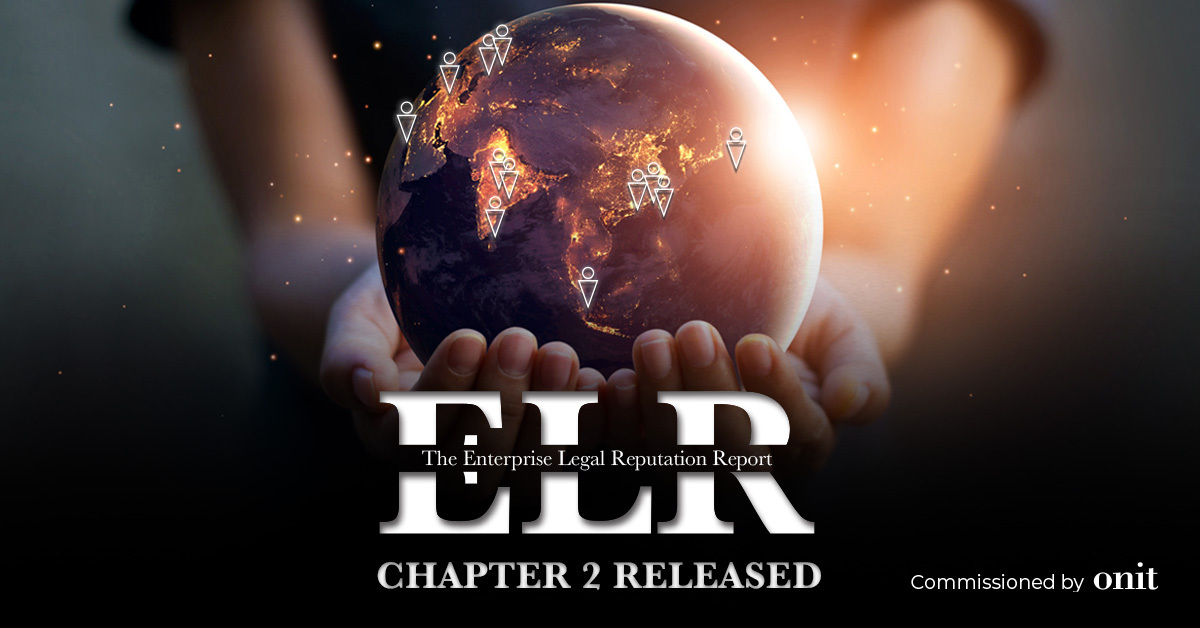Chapter two of the Enterprise Legal Reputation (ELR) Report unveils new potential for legal departments to directly and positively impact material growth, operational efficiency, and cultural transformation. Here’s how Legal can be a top game-changer for its business.
There are two sides to every story.
Chapter one of the Enterprise Legal Reputation (ELR) Report — a third-party, multinational study of 4,000 enterprise employees — delved into the image of corporate legal teams through the eyes of enterprise employees and revealed a Perception Paradox: Although four in five (78%) employees consider Legal as outstanding protectors of the business who impart good advice, two in three (65%) have knowingly bypassed Legal, at least on occasion.
Chapter two of the ELR Report examines Legal’s perception of its own department by shining a spotlight on the parallels and perspectives of 500 corporate legal professionals from the United States (200 respondents), United Kingdom (100), Germany (100), and France (100). Is Legal aware of its brand image by its constituents? Does the department know what similarities and differences exist between their perceptions and those of its enterprise employees? And ultimately, how can Legal have greater impact on the materiality and growth of its business?
Similar attitude, legal latitude
When it comes to exploring the connection between Legal and its internal clients, nearly three in four (73%) respondents cite positive relationships. These figures are similar to the responses from enterprise employees in chapter one, where three in five (60%) reported harmonious partnerships. Legal believes its collegiality ranks highest with Finance (84%) and HR (79%), and employees reported the best collaboration with these departments as well, although at a slightly lower clip (62%). Further, nine in 10 (91%) corporate legal respondents believe they share exemplary interactions with their internal clients, and almost every corporate Legal respondent (95%) considers their department efficient in managing service requests, a number that wavered only slightly spanning the globe, with 98% in Germany, 96% in the United Kingdom, 95% in the United States, and 91% in France.
Why, then, do three in every four Legal employees feel the strength of their connection with internal clients is solid when less than two in five enterprise employees concur? Despite Legal believing it has “good” or “very good” relationships with IT (78%), Procurement (76%), Sales (74%) and Marketing (73%), the feeling is different from the enterprise employee perspective, sitting at just 38% for IT, 37% for Procurement, 43% for Sales and 37% for Marketing.
While Legal being confident about their relationships is to be commended, these inconsistencies in awareness represent an incongruity and potential obstacle — also known as the Iceberg Effect.
Part of the issue in differing levels of perception could be taking an outside-in view: Since Legal sets the standards for what needs to be accomplished in its department, Legal innately presumes it is accomplishing what needs to be done. And, in fact, many legal teams are doing an extraordinary job. In chapter one, enterprise employees were quick to note how Legal excels at negotiation, procuring vendors and services, and impacting the corporate brand.
Yet what this variance also indicates is the presence of untapped potential. Legal has the capability to be more than a risk mitigator and compliance officer; to do more than review, manage, and sign contracts. This is a chance for Legal to command a place at the table as a transformational change agent and business influencer impacting topline revenue, innovation, competitive differentiation, brand, and corporate culture.
Steering clear of the Iceberg Effect
When it comes to impacting the business where it matters most, Legal is in safe and steady waters supporting Sales and the revenue acquisition process. In fact, nowhere is Legal’s ability to steer the ship clearer than here: More than half (56%) of enterprise employees say Legal kickstarts sales and revenue operations, with 48% citing Legal’s acceleration of deal cycles. Nearly seven in 10 (68%) legal professionals also believe they help Sales effectively close urgent deals, a sentiment that skyrockets to an incredible 84% in Germany.
There can be no revenue recognition until contracts are signed, though, and with two in five legal respondents (40%) spending four to five hours – at least half of every business day – reviewing and managing contracts, Legal expresses a definite need for speed and modernization. Nearly half of respondents (47%) claim their current technology is insufficient. But optimizing with automated tools powered by the combination of artificial intelligence (AI) and contract lifecycle management (CLM) is the key to advancing the entire contract process, from document generation and redlining to e-signature and finalization. This acceleration can pilot faster decision-making on how to push contracts through review cycles, renewals, and negotiation, scaling the speed and growth of revenue generation (44%) as well as mergers and acquisitions (23%).
Legal’s role in materially impacting its business
While the crux of a business’ success may be defined by its sales and revenue, Legal holds the power to influence other functions across the enterprise, too. There can be no sales without a valuable product or service, and more than three in five (61%) legal professionals believe they play a prime role in positively impacting their businesses’ abilities to innovate and differentiate competitively by protecting company patents and intellectual property (IP).
Even beyond the scope of innovation and ideas, it is people who make up the atomic units of a business. Corporate culture and diversity, equity, and inclusion (DEI) are fundamental to operational efficiency and growth. Fortunately, four in five (80%) enterprise employees view Legal as a great partner for procuring vendors and services, and more than half of respondents (52%) worldwide report their departments and companies are now prioritizing vendor diversification. Yet another Legal priority is improving data security, with one in three employees (33%) highlighting the importance of cyber risk management.
It is within these forward-thinking sectors – DEI and data privacy — that Legal can uncover its formula for future success and evolve from a transactional, back-office brand into a visible business influencer, vanguard of innovation, and advocate for diversity and inclusivity. By doing so, Legal can pivot the Perception Paradox and melt the Iceberg Effect, connecting more deeply with its internal clients, ramping up material growth and operational excellence, and expanding its image as guardian of the enterprise into an even more significant role as protector.
Read the ELR Report to learn more about how legal professionals view their relationships with internal clients in comparison to the image enterprise employees have of their legal departments.






